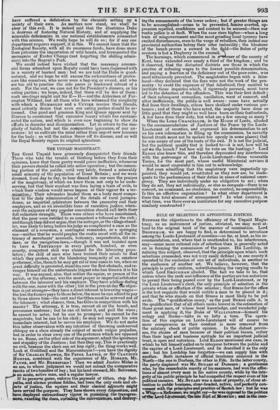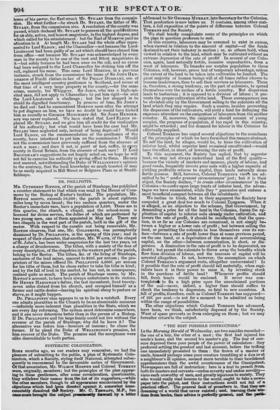RULE OF SELECTION IN APPOINTING JUSTICES.
SUPPOSE the objections to the efficiency of the Unpaid Magis- tracy, as an instrument of justice, obviated, we may next at- tend to the original taint of the manner of nomination. Lord BROUGHAM, we are happy to find, is determined to introduce amongthe Lords-Lieutenant of counties—so far, at least, as his re- commendation, and, where that is unattended to, his interference, may—some more rational rule of selection than is generally acted on in forming the commission of the peace. His Lordship, in noticing this subject, observed, that the principle upon which such selections proceeded, was not very easily defined ; in one county it operated to the exclusion of one set of individuals, in another to the exclusion of another set. We believe, however, that the principle is pretty uniform, notwithstanding the varying results to which Lord BROUGHAM alluded. The fact we take to be, that unless where the rank and influence of the parties are too notorious to permit their being passed over by the Lord-Lieutenant, or by the Lord-Lieutenant's clerk, the only principle of selection is the private whim or affection of the selector ; that fitness for the office is the last requisite that would entitle a man to be placed in it; and that he who stands on that fitness is most likely to be put aside. The "qualification saucy," as the poet BURNS calls it, is the qualification that of all others ranks lowest in the estimation of those great men, of whose local knowledge, and wonderful judg- ment in applying it, the Duke of WELLiernToN—himself his eulogy and theme—talks in so lofty a tone. The opera- tion of this caprice on Lords-Lieutenant will of course be more conspicuous as their conduct is more removed from the salutary cheek of public opinion. In the distant provin- ces, the choice of men because of their political biases, rather than their legal and business aptitude for an important judicial trust, is open and notorious. Lord ELDON mentioned one case, in which he felt himself called onto interpose between the public and the capriee of a Lord-Lieutenant, and he described it as the only one ; but his Lordship: has forgotten—we can supply him with another. Both instances of official insolence occurred in the North—the one in Durham, the other in Fife. In the latter county, the party displaced was Mr. STUART of Dunearn ; a gentleman who, by the remarkable suavity of his manners, had won the affec- tions of almost every man in his native county, while by the inte- grity of his public principle he had compelled the respect even of his political enemies. Mr. STUART was a man of property, of close at- tention to public business, clear-headed, active, and perfectly con- versant with the principles and practice of Scotch law : but he was a Vtrhig—a Reformer, we might say—he was opposed to the politics 'Ofthe Lord-Lieutenant;the late Earl ofMoaloet ; and lathe inso- knee of his power, the Earl struck Mr. STUART from the commis- sion. He went farther—he struck Dr. STUART, the father of Mr. STUART, from the commission also. A resolution of the county was .passed, which declared Mr. STUART to possess all the qualifications for an able, active, and honest magistrate, in the highest degree, and which called for his reinstatement : but the Earl of MORTON paid no attention to it At length Mr. STUART had the whole affair repre- sented to Lord ELDON; and the Chancellor—not because the Lord- Lieutenant had been guilty of an act which should have chased him from office—not because Mr. STUART was acknowledged by every man in the county to he one of the best and fittest magistrates in it—but solely because he had been once on the roll, and no cause had been assigned to the Lord Chancellor for striking him off the roll, replaced his name. This same Lord MORTON, in a previous instance, struck from the commission the name of Sir JOHN HEN- DERSON of Fordil (father-in-law of Sir PHILIP DURHAM), one of the most intelligent country gentlemen in Scotland, and owner at that time of a very large property in the county,—for the same crime, namely, his Whiggery. Sir JOHN, who was a high-spi- rited man, did not apply to Chancellors to put him right—he sent the Lord-Lieutenant a challenge ; but the law stepped in to shield its dignified functionary. In process of time, Sir JOHN'S ire died out : had he encountered MORTON soon after the attempt to put disgrace on him, we have no doubt he would have kicked him as soundly as GEORGE MONCRIEFF did. Sir JOHN HENDER- smy was never replaced. We have stated that Lord ELDON re- placed Mr. STUART, and we give him all credit for the vindication of his authority ; but what would have been the case had Mr. STUART been neglected only, instead of being deprived ? Would Lord ELDON, on the recommendation of the gentlemen of the county, have interfered to put him on the commission ? Would not the commission have grievously suffered from the absence of such a man ; and does it not, in point of fact, suffer, iii every county in Great Britain, from the absence of such men? If Lord BROUGHAM'S suggestions be not largely acted on, we hope he will not fail to exercise his authority in giving effect to them. He may rest assured, notwithstanding the Duke of WELLINGTON'S opinion to the contrary, that the local knowledge so much boasted of may be as easily acquired in Hill Street or l3elgrave Place as at Strath- fieldsaye.



























 Previous page
Previous page